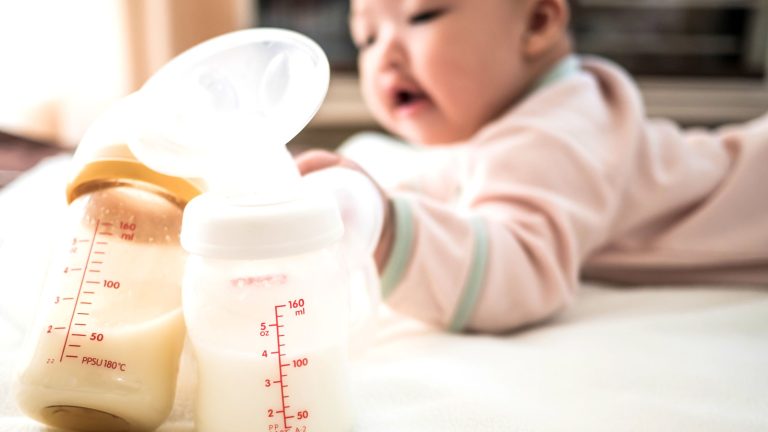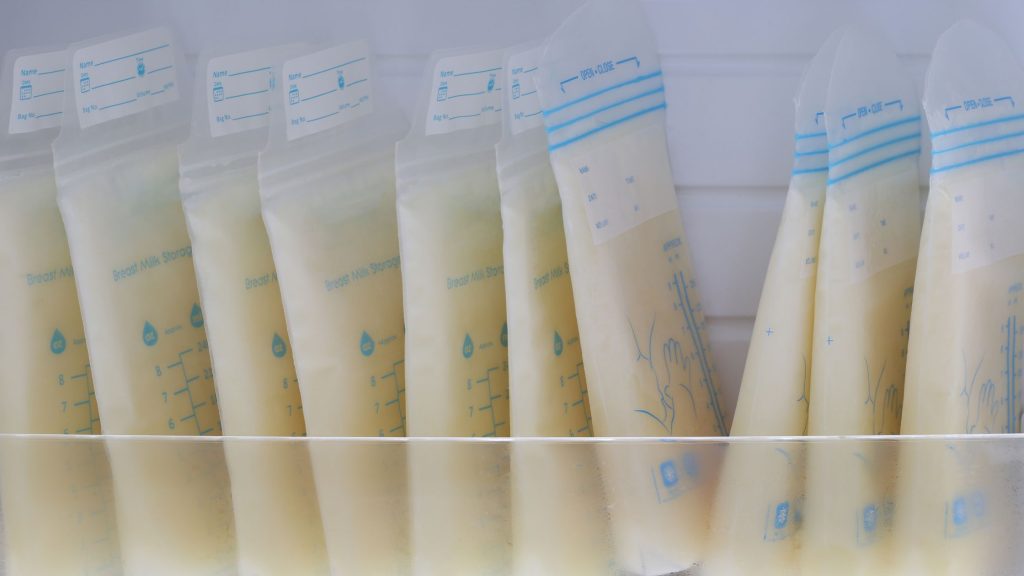
What Happens If My Baby Drinks Spoiled Breast Milk?
- Created:
18. 4. 2023 - Updated:
5. 10. 2023
Sometimes, despite how cautious you are when tending to your baby, accidents will happen, and it can be spine-chilling.
This post is about what will happen if your baby drinks spoiled breast milk. I will go through some of the probable symptoms and what you should do in such a scenario.
Let’s get into it.
What Happens If My Baby Drinks Spoiled Breast Milk?
Several things could happen if you accidentally feed your baby spoiled milk. First, the baby can start vomiting after ingesting the milk. The baby can also develop stomach upset, diarrhea, and fever symptoms. If the milk is severely spoiled, it could result in a severe infection.
Sometimes:
The baby will be okay and won’t develop any symptoms. This is possible for babies with strong immunity and if the breast milk was just beginning to turn bad.
Before getting deeper into what happens if a baby drinks spoiled milk, let’s talk briefly about what happens when breast milk goes bad.

Why Does Breast Milk Go Bad?
Now:
The USDA Dietary Guidelines for Americans, the American Academy of Pediatrics (AAP), and the World Health Organization (WHO) all recommend exclusive breastfeeding of infants for the first 6 months.
This is either through breastfeeding or bottle-feeding expressed or pumped breast milk.
While breastfeeding is the most recommended way of feeding, not every nursing mom is able to do it exclusively.
For instance, when one has to get back to work. That’s where expressing or pumping breast milk comes in.
While expressing and pumping milk allows mothers to breastmilk feed their babies even when they are away, there is the risk of the milk spoiling.
There are three major ways in which breast milk spoils.
1. Introduction Of Contaminants
The first way in which breast milk spoils is through the introduction of contaminants or cross-contamination.
This is the unintentional transfer of bacteria and other microorganisms into breast milk.
For instance, if there is mold or bacteria in the breast pump piping, they will end up in the pumped milk.
Other examples of how breast milk gets contaminated include
- Contamination from dirty hands
- Contamination from cream or ointment applied on the breast
- Improper or dirty storage methods
- A dirty breast pump kit for instance the tubing
2. Overgrowth of Bacteria
Breast milk will also spoil from the overgrowth of bacteria already present in the milk.
Now:
Breast milk contains over 200 types of bacteria. Some of these bacteria, such as Lactobacillus, will multiply and start converting lactose to lactic acid.
That’s why breast milk should be refrigerated or frozen to stop or slow microbial activity.
Low or freezing temperatures prevent degradation and reactions between components.
Some of the components found in breastmilk include
- live cells
- protein
- amino acids
- complex sugars
- enzymes
- hormones
- vitamins and minerals
- antibodies
3. Exceeding The Shelf Life
The moment breast milk exceeds its shelf life, it is regarded as spoiled.
The table below shows the shelf life of breast milk depending on the storage method.
| Countertop at room temperature77°F (25°C) | Refrigerator40°F (4°C) | Freezer0°F (-18°C) or colder | |
| Freshly pumped or expressed milk | Up to4 hours | Up to4 days | Up to12 months |
| Thawed, previously frozen | Between1-2 hours | Up to 24 hours | Never refreeze thawed breastmilk |
| Leftover breastmilk | Up to 2 hours | Up to2 hours | Don’t freeze leftover breastmilk |
Breast milk can also spoil due to other reasons, such as:
- Medication or drugs taken during breastfeeding
- Improper thawing techniques
- Lower temperatures in the fridge or freezer
- Placing breast milk in the fridge door trays
- Excess lipase activity in the milk

Factors That Influence The Severity of Symptoms
Now:
Before we look at the different symptoms that babies exhibit when they drink spoiled milk, let’s look at what determines the symptoms.
1. How Bad Was The Milk?
The major determinant of what happens when a baby drinks spoiled breast milk is the nature of the milk.
Spoiled breast milk can have varying degrees of spoilage. For instance:
- Slightly spoiled
- Moderately spoiled
- Severely spoiled
- Contaminated
For instance, it is recommended to throw away freshly expressed or pumped milk if it has been sitting on the counter for over 4 hours.
A baby who drinks milk that has been on the counter for 6 hours will probably show no symptoms. This will be different if the milk has been on the counter for about 24 hours.
This is because breast milk does not automatically spoil after sitting on the countertop for 4 hours.
But you can be sure that breast milk that has been on the counter for more than 24 hours will have gone bad.
2. Type of Contamination
As I mentioned above, breast milk will spoil if there is an introduction of contaminants or an overgrowth of some of its natural bacteria.
A child who drinks breast milk that has contaminants such as mold from pump tubings may exhibit more serious symptoms than a baby who drinks milk that has exceeded its shelf life by a few hours.
3. The Amount Of Spoiled Milk Consumed
The symptoms will also depend on how long the baby has been drinking the milk.
For instance, if it’s a specific batch of milk that is spoiled, how much has the baby drunk?
If the baby has only drunk a few ounces, the symptoms may be different than when the baby has drunk several bottles.
4. Baby Age And Tolerance
The age of the baby may also determine the symptom. An older baby may have stronger immunity than a newborn.
10 Symptoms Of Drinking Spoiled Breast Milk
1. The Baby Won’t Show Any Symptoms
Here is some relieving news.
Your baby will be fine, and they won’t show any symptoms.
This can be the case if the breast milk is slightly spoiled, for instance, when it has exceeded its shelf life but hasn’t gone bad.
For instance, freshly expressed or pumped breast milk is supposed to be refrigerated for a maximum of 4 days.
If the milk you just fed the baby has been in the fridge for 5 days, there is a likelihood that the baby won’t show any symptoms.
This is the same case for thawed milk that has been on the counter for about 4 hours. This is considering that thawed breast milk should be consumed within 2 hours.
Why?
The storage guidelines err on the side of caution. It does not mean the milk automatically spoils on the dot.
Even if the baby does not show any symptoms, discard the milk. Also, keep an eye on the baby for the next day or so for any symptoms.
2. Vomiting
Now:
Just like an adult’s body, the body of an infant can identify harmful substances such as spoiled milk.
After ingesting the milk, the baby may start vomiting as the body attempts to get rid of the harmful milk. Vomiting may also occur if the milk has irritated the baby’s gut.
If the baby has only vomited a few times and seems fine, they will probably be okay.
However, if the vomiting is intense and is accompanied by other symptoms, such as fever, then it might be serious.
3. Stomach Upset
Another symptom of drinking spoiled breast milk is stomach upset or stomach ache.
The pain can be mild or severe, depending on the state and the amount of spoiled milk consumed.
A few signs that a baby is having stomach ache include
- crying
- acts fussy
- discomfort
- refuses to eat
- refuses to sleep
- squirming
If your baby is showing these signs, try soothing them or giving them a pacifier.
If the baby seems to be in extreme pain, contact your doctor immediately. This should also be the case for non-stop screaming and tense body language.
5. Diarrhea
Drinking spoiled milk may also irritate and inflame the digestive system, resulting in diarrhea.
The baby will have more bowel movements than usual. Also, the stool will be loose or watery.
The table below shows the different types of diarrhea in babies.
| 3-5 times a day | Mild diarrhea |
| 5-9 times a day | Moderate diarrhea |
| 10 plus | Severe diarrhea |
The most important thing to check is the severity. Also, check if there is mucus, blood, or a very foul smell.
Contact your doctor as soon as possible if diarrhea is accompanied by other symptoms such as vomiting, fever, or a stomach ache.
Note:
Diarrhea can easily cause dehydration, which can be life-threatening.
Try as much as possible to keep the baby hydrated. This is either by breastfeeding them or giving them water if they are older than 6 months.
If you notice any signs of dehydration, such as dry skin, a dry mouth, sunken eyes, or dry diapers, among others, contact your doctor.
6. Odd-Colored Stools
Now:
Another rare symptom that a baby can show after drinking spoiled milk is an odd-colored stool.
If your baby has been feeding on breast milk only and there is a sudden change in the color of the poop, it may be an indication that something is wrong.
When I say “odd-colored poop,” I am referring to any color that is outside the normal colors of a baby’s poop.
A breastfed baby’s poop should be mustard yellow or green in color.
For instance, red poop can be a sign of infection from spoiled breast milk. Cracked and bleeding nipples of a mother can lead to the baby ingesting some blood during breastfeeding, which may also result in red poop
7. Lethargy
Some babies may also be lethargic after drinking spoiled breast milk. The baby will appear to have no energy.
They will sleep longer and seem drowsy or sluggish. In such a case, it can be a sign of an infection or dehydration.
8. Refusing To Feed
Depending on how the baby is feeling, the baby may also refuse to feed.
This is common if the baby is experiencing other symptoms such as fever, diarrhea, and vomiting.
9. Fever
A baby may also develop a fever after drinking spoiled breast milk.
Fever in babies is a sign that their body is fighting an infection, which in this case could have been caused by the ingested milk.
According to AAP, a true fever is when
- Rectal temperature of above 100.4°F (38 °C)
- Oral temperature of above 99°F (37.2 °C)
Fever may also be accompanied by other symptoms such as diarrhea and vomiting.
10. Severe Infection
Sometimes spoiled milk can also cause a severe infection such as Enterobacter sakazakii infection.
This National Library of Medicine report details how an exclusively breastfed baby was diagnosed with this infection.
After a thorough investigation, the cause was found to be contaminated breast pump parts. The report recommends boiling or steaming breast pump kits daily, especially when feeding babies under the age of 3 months.
This study tested 303 samples of donated breast milk and found 87% of the samples had Staphylococcus bacteria, while 16% of the samples had Enterococcus bacteria.
One sample even contained methicillin-resistant, which can be life-threatening.
What does this mean?
Breast milk must not be spoiled to be bad. Fresh-looking breast milk can be carrying harmful bacteria.
Since most of these bacteria come from cross-contamination, nursing mothers should be extra careful when expressing and storing breast milk to prevent the entry or growth of harmful bacteria.
What Should I Do If Baby Drinks Spoiled Breast Milk?
Now:
What should you do if your baby has ingested spoiled milk?
Well, I know the natural reaction would be panic, but try to stay calm.
1. Determine The Amount Of Spoiled Milk Consumed
The moment you realize the breast milk is spoiled, stop feeding if the feeding was in progress.
If the baby has already drunk the milk, find out how much they have consumed. Also, assess the condition of the milk.
Your doctor will ask for this information.
The condition of the milk will guide your next course of action and help you predict the symptom. For instance, if the consumed milk had mold growth, that should be a major concern.
If the milk looks fine and only a small amount was consumed, that should be a slight relief.
2. Look Out For Symptoms
Keep a close eye on the baby to see if they will develop any symptoms. This is especially if the baby is not showing any symptoms at the moment.
If the baby is showing symptoms, consult your pediatrician.
3. Consult Your Pediatrician
Even if the baby is not showing any symptoms, consult your pediatrician.
The doctor will provide you with reliable information on what to look out for and may recommend medication if the baby has already developed some symptoms, such as a fever.
For a preterm newborn, a baby under 3 months old, or a sick baby, contact your doctor as soon as possible, even if they are not showing any symptoms.
4. Discard The Milk And Feed The Baby Fresh Milk
This is obvious, but it’s worth reiterating.
Discard all of the spoiled milk, even if it’s a lot.
Secondly, breastfeed or feed the baby freshly expressed or pumped milk.
Breastfeeding helps with recovery and is also a great way to comfort the baby if they are experiencing any discomfort.
Breastmilk will also help in fighting any infection that may result from the ingested milk
5. If The Baby Is Vomiting Let Them Do It
Now:
One of the most common symptoms of drinking spoiled breast milk is vomiting, so you should know how to handle it.
First, don’t try to stop the baby from vomiting. Secondly, hold the baby in an upright position so they don’t swallow or choke on their vomit.
Also, put them on their side when they are sleeping to prevent swallowing their vomit in case they throw up.
Lastly, don’t breastfeed or bottle-feed the baby immediately after vomiting. Give them a little time for the tummy to rest.
Check on the color of the vomit and the frequency, and make sure to inform your doctor.
How Long After Drinking Spoiled Milk Will A Toddler Get Sick?
Now:
It will take between 1 and 24 hours for the baby to show any symptoms. Some symptoms, such as stomach upset and vomiting, may occur sooner than fever and diarrhea.
The time it takes will depend on, among other factors, how bad the milk was, the age of the baby, the amount of milk consumed, and the overall general immunity of the baby.
If the milk was only slightly spoiled, the baby may not show any symptoms.
Does Milk Get Spoilt In The Breast?
No, breast milk cannot spoil in the breast. Breast milk spoils from cross-contamination, which happens during breastfeeding, pumping, storage, and consumption.
That’s why it’s safe to breastfeed even when you are sick.
Final Tip: Smart Feeding and Diaper Tracking with Annie Baby Monitor
Worried about the freshness of your breast milk or formula?
Annie Baby Monitor can be your trusty ally in keeping your baby safe and well-fed. This baby monitor app goes beyond regular monitoring; it’s your partner in smart parenting.
Keep track of feeding schedules and diaper changes with the Annie Baby Monitor feature baby tracker.
With real-time alerts and reminders, you can be sure that your little one is always getting the freshest milk in time.

Curious about more ways to ensure your baby’s well-being and nutrition? Check out our collection of articles that offer handy tips on feeding and diapering your little one. They’re written to help you navigate the ups and downs of parenting and make the journey a bit smoother.
Don’t forget to share your experiences with us and the App Store!
Conclusion
Several things can happen if your baby drinks spoiled milk. The different symptoms include vomiting, stomach upset, diarrhea, fever, lethargy, and refusal to feed.
There are cases where the baby will be fine and won’t show any symptoms.
If you find yourself in such a scenario, there are a few things you can do to help your baby. Firstly, contact a doctor or pediatrician immediately. Make sure you have determined the state and amount of spoiled milk the baby has consumed to help the doctor assess the situation better.
Monitor the baby closely for any signs of illness. It’s also important to breastfeed or feed them freshly expressed milk, as it can help in recovery.
Frequently Asked Questions on Babies Drinking Spoiled Milk
There are a few things that can happen when a baby drinks spoiled milk. They include: vomiting, stomach upset, diarrhea, fever, lethargy, refusal to feed, severe infection.
Sometimes the baby will be okay and won’t show any symptoms.
Signs of spoiled breast milk include: foul smell, failing to mix after swirling, sour taste, exceeded shelf life, improperly stored breast milk.
Note:
A fishy, metallic, or soapy smell doesn’t always mean the milk is spoiled. The baby may refuse to feed on the milk because of the taste, but the milk may not be spoiled.
A sour taste is one sign that breast milk has spoiled. Don’t feed your baby such milk since it can make the baby sick.






